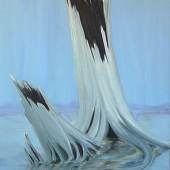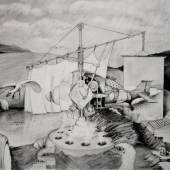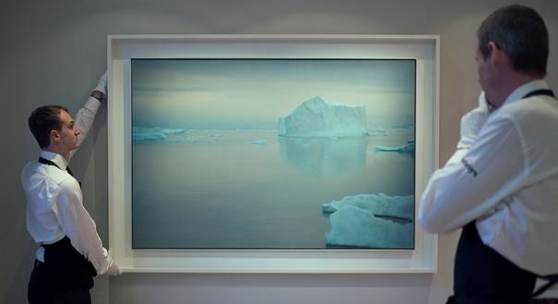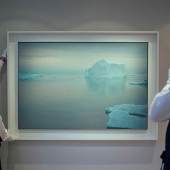Sotheby's London
Richter’s “Eisberg” to Lead Sotheby's London Contemporary Sales
-
Auktion08.03.2017
Sotheby’s London, 19 January 2017 -- One of the finest landscape paintings of Gerhard Richter’s career will come to auction for the first time in March 2017 at Sotheby’s London Evening sale of Contemporary Art.
The desolately beautiful Eisberg was painted soon after the artist’s divorce from his first wife Ema in 1981. Gerhard and Ema had been married for 25 years, but by the early 1980s Richter was living with Isa Genzken, a successful young artist. In the words of his biographer, Dietmar Elger, Eisberg was created as an attempt "to work through his unfulfilled hope for familial happiness and to take final stock of a difficult period in his life."
The frozen seascape, with its perfectly balanced spectrum of icy, arctic hues, is widely considered a metaphor for Richter’s state of mind at the time, and perhaps even as a meditative allusion to self-portraiture.
The dramatic composition is based on photographs taken by the artist a decade earlier, when he embarked on an Arctic expedition to photograph Greenland in 1972 during a troubled patch in his marriage. The journey provided a psychological retreat from his life in Dusseldorf, and was to be the catalyst for some of the most powerful images of his career.
"The project was…an excuse for getting away... Trouble in my marriage was reaching a climax. Going into the ice could be interpreted as longing for a place where one feels safe – just so long as there is no life, only ice." – Gerhard Richter
Estimated at £8-12 million, Eisberg is the largest of only three Iceberg paintings made by Richter. The second work is held in the prestigious collection of Doris and Donald Fisher that is promised to the San Francisco Museum of Modern Art. A third work, Eis (1981) sold at Sotheby’s London in February 2012 for £4.3 million ($6.75 million).
Eisberg has remained in the same Private European collection since 1983, the year after it was painted.
Paintings with a landscape motif have played a central role in Richter’s practice for over 35 years. No other subject has fascinated the artist so extensively nor occupied him over such a long period. However, the total number of landscape paintings that he has made is relatively low, rendering them hugely rare, and deeply sought-after within his oeuvre.
When asked why he chose to depict landscapes, Richter pronounced: “I felt like painting something beautiful.”
-
Drawing on the canon of art history, and long tradition of landscape painting, Eisberg pays homage to the work of another great German artist, Caspar David Friedrich’s The Sea of Ice. Painted in 1823-1824 in Dresden, the city of Richter’s birth, Friedrich’s masterpiece depicts William Edward Parry's heroic ship HMS Griper trapped in the ice as it charted the then unprecedented Northwest Passage in 1820.
Like Eisberg, The Sea of Ice is rich with autobiographical import, in this case drawing on the on the tragic death of Friedrich’s brother Christoph. When Friedrich was ice-skating aged just 13 he was saved from drowning by Christoph, but in doing so Christoph tragically drowned in the icy water before the artist’s eyes.
Dietmar Elger argues: "What Richter saw reflected in the painting… was his own state of mind…the photographs he took in Greenland were visual analogues for his own failed hopes. He was exhausted by the struggle to find his own way as a husband and father, and felt that his dream domestic happiness had, as a consequence, been wrecked."
-
11.12.2024Iconic Heuer Monaco Worn by Steve McQueen in LeMansRaces to Auction at Sotheby’s New York...
-
08.03.2017Auktion »
Sotheby’s London Contemporary Art Evening Sale, 8 March 2017









